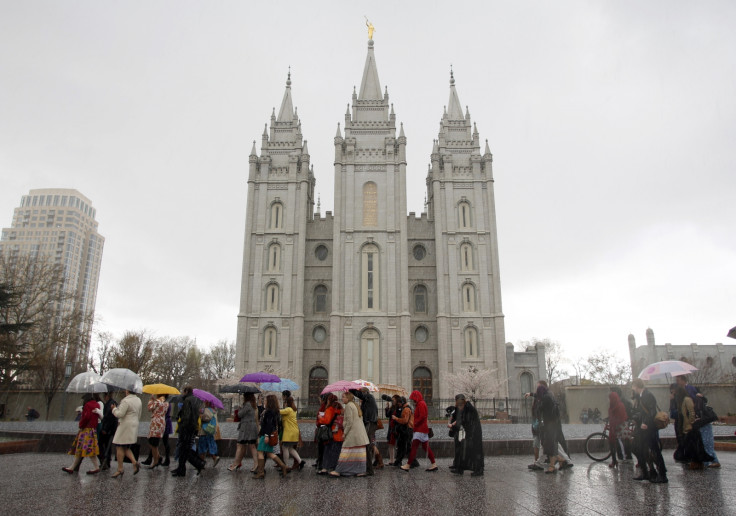Lesbian stopped from telling her Mormon congregation she's gay as church ignores calls for LGBT reform
Church leaders in in Eagle Mountain, Utah, turned off the 13-year-old's microphone during her speech.

A video of a young Mormon girl revealing to her congregation that she is lesbian and still loved by God — before her microphone is turned off by local church leaders — is sparking a new round of discussions about how the religion handles LGBT issues.
Savannah, 13, spoke on May 7 in Eagle Mountain, Utah, about her belief that she is the child of heavenly parents who didn't make any mistakes when she was created. Her comments came during a once-a-month portion of Mormon Sunday services where members are encouraged to share feelings and beliefs.
"They did not mess up when they gave me freckles or when they made me to be gay," she said, wearing a white shirt and red tie. "God loves me just this way."
Her mother, Heather Kester, said Friday that her daughter was passionate about coming out in church to be a voice and example for other LGBT children who struggle for acceptance within The Church of Jesus Christ of Latter-day Saints. She asked that Savannah's full name be withheld to protect her privacy.
The Mormon religion is one of many conservative faith groups upholding theological opposition to same-sex relationships amid widespread social acceptance and the U.S. Supreme Court's decision legalizing gay marriage. At the same time, the Mormon church is trying to foster an empathetic stance toward LGBT people.
The video , which Kester says was taken by a friend of Savannah who came to support her, has generated buzz after it was circulated online this month and featured in a Mormon LGBT podcast.
While some consider Savannah a hero, other Mormons are upset that it was videotaped and is being circulated by church critics to try and paint the church in an unflattering light.
Judd Law, the lay bishop who leads the congregation south of Salt Lake City, said in a statement distributed by church headquarters that Savannah is a "brave young girl" and that the congregation is making sure she and her family feel loved.
But he called problematic the unauthorized recording and the "disruptive demonstration" by a group of non-Mormon adults who were there.
Law said they exploited the events to politicize worship services and violate church decorum. "We do not politic in our chapels, and exploiting this recording for political purposes is inconsistent with the nature of our worship services," he said.
Law didn't address or explain the decision by two of his counselors to cut the microphone. Law wasn't at the service that day.
Savannah read from written notes from the pulpit. Kester said she is not Mormon, but her husband is and Savannah has been raised in the religion.
"I do not choose to be this way and this is not a fad," Savannah said on May 7. "I cannot make someone else gay ... I believe that God wants us to treat each other with kindness, even if people are different, especially if they are different."
Her microphone was muted after about two minutes — shortly after she said she's not a "horrible sinner" and that she someday hopes to have a partner, get married and have a family. She turned around to listen to something a man in a suit told her and then was walked down from the pulpit.
Kester said her daughter came and cried in her lap. She told her she was beautiful and that God loved her, Kester said.
"I was devastated for her," said Kester, adding. "I was angry at how that was handled."
After the Utah-based Mormon church received backlash in 2008 for helping lead the fight for California's Proposition 8 constitutional ban on gay marriage, religious leaders spent several years carefully developing a more empathetic LGBT tone. That was interrupted in 2015 when the church adopted new rules banning children living with gay parents from being baptized until age 18.
In October, church leaders updated a website created in 2012 to let members know that that attraction to people of the same sex is not a sin or a measure of their faithfulness and may never go away. But the church reminded members that having gay sex violates fundamental doctrinal beliefs that will not change.
Scott Gordon, president of FairMormon, a volunteer organization that supports the church, wrote a blog defending the church against a rash of criticism over the incident.
Gordon said it would have been OK for Savannah to come out as gay during testimony, but that she crossed the line when she mischaracterized church teachings by saying God would want her to have a partner and get married.
"While you can believe almost anything you want to believe, you can't preach it from the pulpit," Gordon said.
Britt Jones, a bisexual Mormon who runs a podcast called "I like to look for Rainbows" that featured Savannah's story, said the leaders should have allowed Savannah to finish.
"Queer issues don't get talked about in the church enough," said Jones, who is married to a woman and has children. "It was really brave and really admirable, particularly for somebody that young, that she not only wanted to talk about it herself but be a voice for others suffering in silence."
© Copyright IBTimes 2024. All rights reserved.





